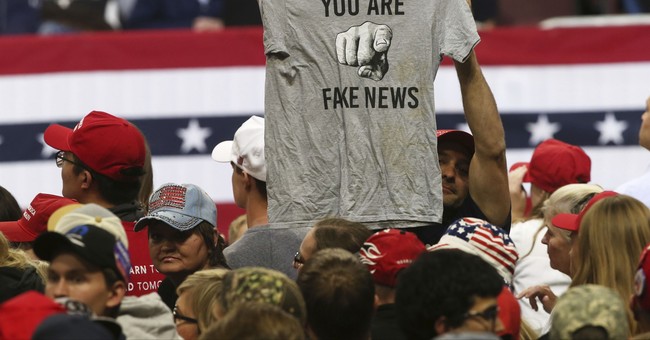
FILE – In this Oct. 4, 2018 file photo, a Trump supporter holds up a T-shirt reading “You Are Fake News” before a rally by President Donald Trump in Rochester, Minn. (AP Photo/Jim Mone, File)
I’ll admit that I have never seen an official job description for a media fact checker, but I imagine that one of the requirements for the job is to not be guilty of what you accuse others of doing.
Where doctors take an oath to do no harm, you would think an oath for fact checkers would read something like “spread no fake news.”
I’m unsure whether or not fact checker Glenn Kessler had to commit to “spreading no fake news” before his stint with the Washington Post started, but if he did he’s violating it on an almost daily basis.
There are numerous examples to cite, but we’ll start with one I documented yesterday, in which Kessler uncritically retweeted a left wing source’s take on a viral video of a Fox News segment featuring a doctor who supposedly “owned” Fox News by making numerous questionable claims about the WHO’s and the Trump administration’s respective responses to the Wuhan coronavirus outbreak early on.
An hour and a half after the tweet went up Friday morning (presumably he retweeted it around the time it was posted), Kessler engaged in a self-own in another tweet, and basically backtracked from the red meat of the original clip:
When I retweeted this I focused on his comment on testing vis a vis South Korea. But the first part of his statement is wrong — while some doctors suspected human-to human transmission in Dec, that was covered up by China for weeks and falsely broadcast by the WHO as no problem https://t.co/QSMrYdQZIT
— Glenn Kessler (@GlennKesslerWP) April 2, 2020
An analysis of other tweets Kessler has uncritically retweeted fit a pattern of a fact checker who is using his platform to pass along information from left wing sources that is … at best misleading, and at worst not true at all.
Pull up a chair, grab some popcorn, and read on.
In the below two tweets, I screen grabbed 5 different tweets from over the last 48 hours or so that Kessler retweeted without questioning. They were either directly from left wing sources (Daily Show, Jon Chait, and Daily Beast editor in chief Noah Shachtman) or they were left wing sources that were tweeted out by other so-called objective reporters at news outlets like the Washington Post (Beijing bureau chief Anna Fifield) and CNN (White House correspondent John Harwood) that Kessler passed along without questioning.
Take a look:
Glenn Kessler, other reporters at the WaPo and CNN sure do have an … interesting habit of uncritically retweeting left wing news sources and their hot takes on various issues. 1/2 pic.twitter.com/8kAzgZt0E9
— Sister Toldjah 😁 (@sistertoldjah) April 4, 2020
I'm sure the reason fact checker Glenn retweets these left wing news sources uncritically has nothing to do w/ agreeing with them. I'm sure it's just because he finds them "interesting or provocative" (even though he doesn't seem to do the same with right wing news sources). 2/2 pic.twitter.com/L3eO1t2Mvl
— Sister Toldjah 😁 (@sistertoldjah) April 4, 2020
While I didn’t analyze the information in all five of the retweets to determine their accuracy, I did look at Fifield’s quote retweet of a video from Vox.com’s Aaron Rupar and Harwood’s “flashback” quote retweet of a Rupar video clip from January.
Rupar has a nasty habit of posting video clips and articles with hot takes that don’t match what was actually said in the video clips he references, and that is exactly what happened in the examples Fifield and Harwood tweeted out as factual, both of which Kessler retweeted uncritically.
Here’s the Rupar video clip that Harwood tweeted (which Kessler retweeted) out with the word “flashback” attached:
Secretary Wilbur Ross says coronavirus will be good for [checks notes] American jobs: "I think it will help to accelerate the return of jobs to North America." pic.twitter.com/Y4SbDIcTi4
— Aaron Rupar (@atrupar) January 30, 2020
CNN’s Jake Tapper was also among the many journalists who uncritically shared this clip with their readers and viewers.
The headline to Rupar’s accompanying piece on the issue was perhaps even worse: “Wilbur Ross sees the coronavirus outbreak as a moneymaking opportunity for the US.”
The problem with Rupar’s tweet hot take and the accompanying piece, which was written in late January after Trump had implemented travel restrictions on China, is that Commerce Sec. Wilbur Ross did NOT callously treat the virus as a money-making opportunity for the U.S.
What Rupar relies on people doing is not watching the video clips he shares, and instead just going off of his take, which is likely what happened here. When you watch the actual video, you will see that Ross’s remarks were not the coldly, clinical “let’s not think about the sickness and death that will come from the virus” quotes Rupar made them out to be.
In the segment, Fox Business anchor Maria Bartiromo talked about how China’s economy had ground to a half over the Wuhan coronavirus and how China commanded a lot of “global growth.” She then asked Ross what the impact of that potentially could be for the United States. Here’s how Ross answered:
WILBUR ROSS: “Well, first of all, every American’s heart has to go out to the victims of the coronavirus. So I don’t want to talk about a victory lap over a very unfortunate, very malignant disease. But the fact is, it does give businesses yet another thing to consider when they go through their review of their supply chain. And top of all the other things, because you had SARS, you have the African swine virus there, now you have this. It’s another risk factor that people need to take into account. So I think it will help to accelerate the return of jobs to North America, some to U.S., probably some to Mexico as well.”
MARIA BARTIROMO: “Oh, that’s a good point, actually. Yeah, because these companies have to do something. They’re going to have to have an alternative once they shut down things in China is what you’re saying.”
ROSS: “Absolutely. And you’ve already heard Apple talking about figuring out how to replace some of the Chinese production. You had others also doing the same thing. And so I think there’s a confluence of factors that will make it very, very likely more re-shoring to the U.S., and some re-shoring to Mexico.”
In other words, because the China supply chain to the U.S. would be pretty much stopped for the foreseeable future, Ross was predicting that on down the line it would lead to a return of more jobs to the U.S. over time, which last I checked was not a bad thing. It was not painted as a “money making opportunity” or “good for American jobs” in the short term. And, of course, Ross had no way of knowing at the time with the U.S. response would be to the spread of the virus.
Not only that, but once things get back to normal here in a few weeks/months, companies across America are going to be doing exactly as Ross hinted in his comments, which is reviewing the supply chain and seeing if they can get their goods and supplies from other sources.
Here’s the Rupar clip that the WaPo’s Anna Fifield tweeted out with the comment “Another Trump administration official who doesn’t appear to know that South Korea is a democracy – a very vibrant and rowdy one at that”, which Kessler also retweeted:
Here's Seema Verma suggesting that one reason South Korea has been so effective in responding to the coronavirus is because it isn't a "free" country like the United States pic.twitter.com/ortfUBBYri
— Aaron Rupar (@atrupar) April 2, 2020
When you watch the clip, however, at no point does Verma say that South Korea was not a free country. I pointed this out to both Fifield and Kessler, but neither responded:
She actually did not say that South Korea was not a free country. This is what the Washington Post gets (again) for relying on a left wing media outlet for their interpretation of a video. SMH.
— Sister Toldjah 😁 (@sistertoldjah) April 3, 2020
Now if Kessler sees this (which he probably won’t), his out will be his disclaimer in his Twitter bio, which reads: “Editor/chief writer of Washington Post’s Fact Checker, revealing the truth behind the rhetoric. I tweet articles & comments I find interesting or provocative.”
The problem, though, is that in tweeting articles he finds “interesting or provocative” without analyzing them for truthfulness, he is not “revealing the truth behind the rhetoric.” He’s uncritically amplifying the rhetoric without dissecting the claims to see if they are correct or incorrect.
This is the antithesis of how a dedicated fact checker should operate, and yet Kessler does it often, and will continue to do so going forward long after this piece is forgotten.
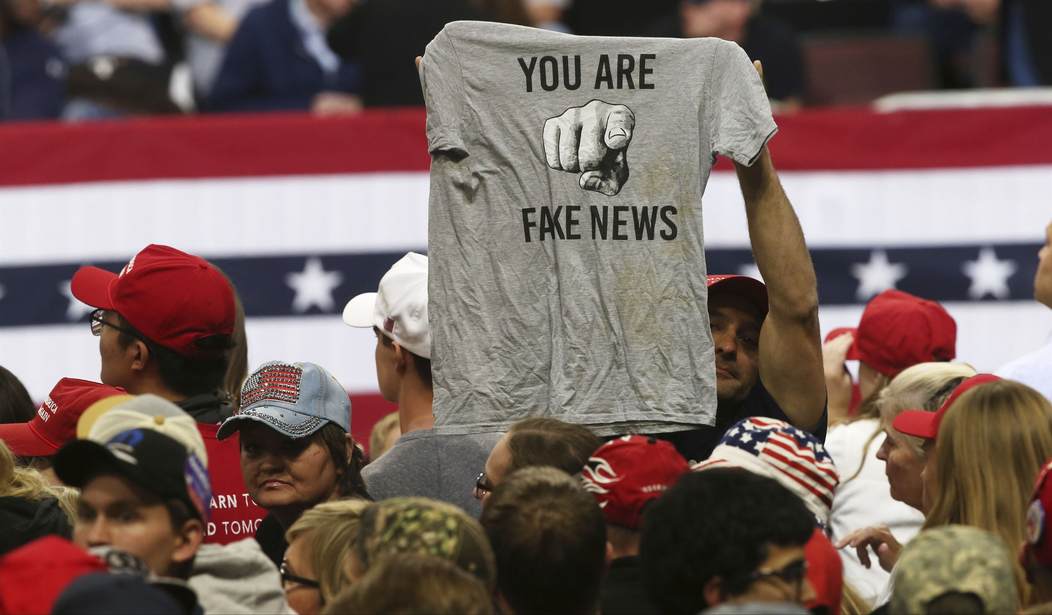


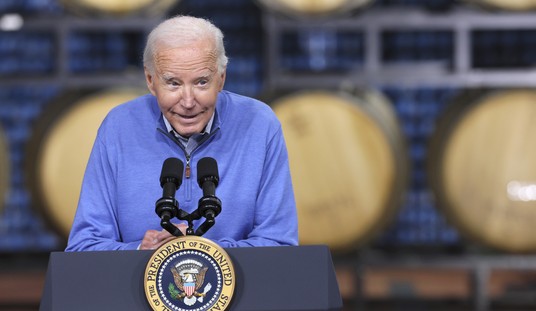


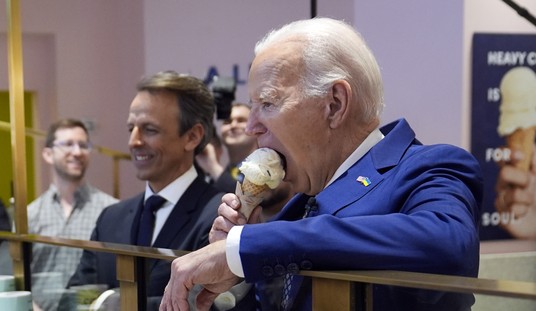




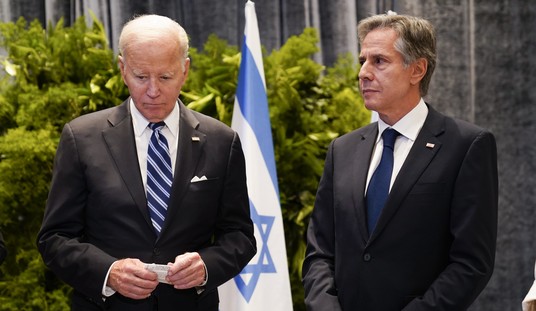

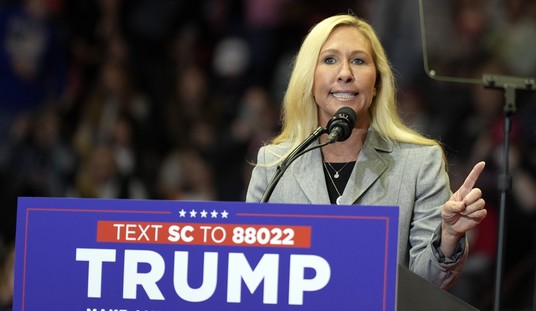

Join the conversation as a VIP Member